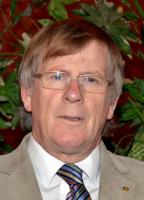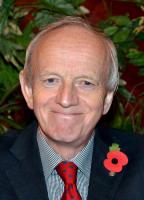Barry Smith told us the story of Donald Simpson Bell
Wed, Sep 6th 2023 at 12:00 pm - 2:00 pm
Bell is the only professional footballer to have won the Victoria Cross Medal. Speaker Finder Barry Smith, Visitors Host, Grace & Banners Mike Clewes, Cash Desk & Sergeant at Arms Barrie Birch
Donald Simpson Bell
When the British Army launched its great Somme offensive in the summer of 1916, few people could have envisaged the devastation that the battle would bring. The opening day alone saw British casualties of almost 60,000 and by the time the slaughter had ground to a halt in the November mud, Britain and her dominions had lost a staggering 400,000 men
Among the dead was 25-year-old Donald Simpson Bell.
I am now going to tell you why Bell means so much to Bradford and especially one part of Bradford history
Born on the 3rd December 1890 at a house in Queen’s Road, Harrogate, Bell first attended St Peter’s Church of England Primary School and then Harrogate Grammar School. It was at the grammar school that he first came to prominence as a talented athlete. A keen cricketer, Bell was captain of his school side, and it was said that he could go further in the sport if he wished.
He attended Westminster College London, where he trained to be a teacher. Whilst at Westminster he followed his first love, football and in September 1909 he signed amateur forms with Southern league side, Crystal Palace. Despite establishing himself as a regular in the college football team, in addition to its rugby and cricket teams, he would leave London in 1911 on completion of his studies, without making an appearance for Palace.
He returned to his native Harrogate and got a job teaching English at Starbeck Council School, now Starbeck Primary School.
Football continued to occupy a significant part of Bell’s life and after spells with Newcastle United’s reserve side and Bishop Auckland, he joined Mirfield United and then in October 1912, he signed his first professional contract with Football League Second Division outfit, Bradford Park Avenue.
He played in defence/midfield and made his debut in 1913 against Wolverhampton Wanders and went on to make 5 more appearances for the Club and helped them secure promotion to the English topflight.
Events further afield were now about to impact on both Donald and the whole country, and with a promising footballing career ahead of him, Bell instead asked Avenue to release him from his contract so he could answer Kitchener’s call to arms. This was duly agreed, and he enlisted as a private in the 9th Battalion of the West Yorkshire Regiment in November 1914. He was the first professional footballer to enlist
Bell excelled in military service and he was granted a commission with the Regiment, also known as the Green Howards in the summer of 1915.
By the end of that year, the British Army had suffered debilitating casualty figures and Kitchener’s “new army” of volunteers, Second Lieutenant Bell among them, were sent across the channel to prepare for the great summer offensive north of the Somme valley.
While on leave in June 1916 Bell got married, marrying Rhoda Margaret Bonson.
After being in reserve for the opening of the battle of the Somme, the 9th Battalion were ordered to the front line on 5th July 1916.
It was on this day that his actions ensured he entered Footballing history. During an attack by the 9th, they were met by very heavy hostile machine gun fire. Bell immediately and on his own initiative crept up a communication trench and followed by Corpl Colwill and Pte Batey, rushed across the open ground under very heavy fire and attacked the machine gun in what was known as Horseshoe Trench, shooting the firer with his revolver and destroying gun and personnel with bombs. This brave act saved many lives and ensured the success of the attack.
Bell did not agree that it was a brave act an wrote home to his mother on 7th July “I must confess it was the biggest fluke alive and I did nothing. I only chucked one bomb, but it did the trick”.
Unfortunately, on 10 July 1916 his luck ran out and Bell was killed while again trying to destroy a German machine gun near the village of Contalmaison-
For his actions on 5 July 1916, Donald Simpson Bell was awarded the Victory Cross and he became the only professional footballer to be ever awarded the VC.
What is the Victoria Cross Medal?
The Victoria Cross Medal was founded during the 1853-56 Crimean War. This was the first war when newspaper reporters were on the front line and a journalist at the Times newspaper, William Howard Russell campaigned for an Award that could be given to ordinary soldiers, not just officers, for acts of bravery.
Although there were concerns that some soldiers might risk their lives by doing dangerous things to win the Medal, MP’s supported it. Queen Victoria was asked to create a special Medal for personal gallantry which could be awarded for every soldier, from the highest to the lowest. And it was Price Albert who suggested it should be called the Victoria Cross. The VC was instituted by Royal warrant on 29 January 1856
Since then, 1,358 people have been award the Medal, 626 in WW1 and 181 in WW2. The number includes 3 soldiers who won a second VC.
The first 62 Medals were presented to veterans of the Crimean War by Queen Victoria in June 1857.The most recent was awarded to Lance Corporal Joshua Leakey following action in Afghanistan in August 2013.
Originally the VC ribbon was dark blue for the Royal Navy and crimson for the Army. Shortly before the RAF was formed in 1918, King George V approved the recommendation that the crimson ribbon should de adopted by all three services.
When the VC was first instituted, the original royal Warrant made no mention of posthumous awards. In fact, it said “would have to be recommended for the VC if they had survived” and it was only in 1900 that a posthumous award was issued and at that time six further awards were issued retrospectively for acts of bravery between 1859 and 1897. However, the Royal warrant was not altered to include the specific provision for posthumous awards until 1920
The award of the Medal to Bell was announced in the London Gazette on 9 September 1916 and the medal was presented to Bell’s wife Rhoda by King George V in a private ceremony at Buckingham Palace,
Bell is remembered as one of the heroes of the First World War and British footballing history. After the war, his body was moved from his initial resting place and reinterred at Gordon Dump Cemetery near Albert.
On 9 July 2000, through an initiative of “The Friends of the Green Howard Museum,” a memorial dedicated to Bell was unveiled on the spot where he lost his life, now known as Bell’s Redoubt. On the 9th of July each year a service is held at Bell’s Redoubt to remember Bell and his comrades. There is also a plaque in Wesley Memorial Church Harrogate, where Bell was a Sunday School teacher.
The VC was formerly displayed at the Green Howards Museum in Richmond, but on 25 November 2010 it was auctioned by the London Medal Specialists, Spinks’ and was purchased by the Professional Footballer’s Association for £210k and is now on display at the National Football Museum in Manchester.
Donald Simpson Bell, not the best player to play for Bradford Park Avenue but undoubtedly one of the bravest and still the only footballer to be awarded the Victoria Cross.
 Contact Barry Smith about this page:
Contact Barry Smith about this page:
'What We Do' Main Pages:

Coming under Community this part of the group exists to undertake environmental projects on behalf of the club.
more
This committee provides the link with Rotary Internationals main charitable trust which primarily deals with projects having a global nature.
more
Rotary is not just about doing good deeds but also about enjoying yourself and this committee organises social activities. This page contains an archive of some of our activities.
moreThis committee works with the other committees to help them raise funds for their individual projects to support charities locally, nationally and internationally.
moreThis is the vehicle that donates the money that we have raised to the various good causes that we support. Its official name is The Rotary Club Of Bradford Blaize Trust Fund and its registered number with the Charity Commission is 514621.
moreThis committee organises social events and deals with the day to day running of the club.
moreThis committee exists to provide PR and communications between the members and also to provide links to non members through the web site and Facebook.
more


